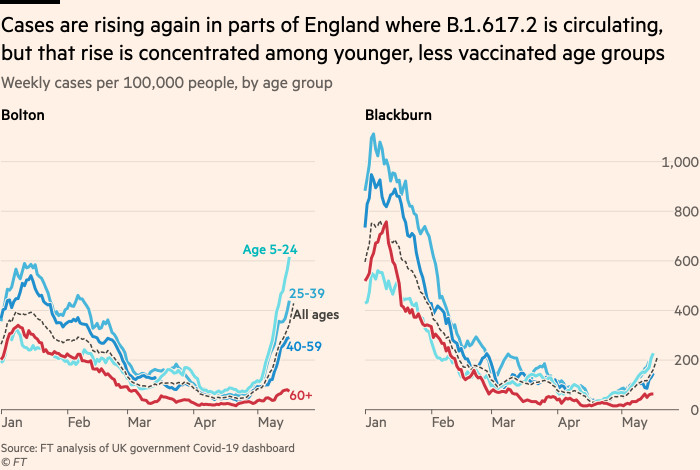[ad_1]
New UK government research suggests two doses of a Covid-19 vaccine are needed to provide strong protection against symptomatic infection from the coronavirus variant first identified in India, according to two people briefed on the preliminary data.
Two vaccine doses provided 81 per cent protection against the B. 1.617.2 variant found in India, and 87 per cent against the B.1.1.7 strain first identified in Kent in south-east England, according to the Public Health England data that was presented to a meeting of the government’s New and Emerging Respiratory Virus Threats Advisory Group (Nervtag).
Two people who attended the Nervtag meeting on Friday said the data showed that one dose offered 33 per cent protection against symptomatic infection from B. 1.617.2, and 51 per cent against B.1.1.7.
This suggests a single shot offers 35 per cent less protection against B. 1.617.2 compared to B.1.1.7, according to Financial Times analysis.
The PHE figures aggregate data from the BioNTech/Pfizer and Oxford/AstraZeneca jabs.
The rapid spread of B. 1.617.2 in pockets of England has cast doubt on the country’s road map out of lockdown, with the next phase due to take place on June 21.
The PHE said: “Public Health England scientists are evaluating the effectiveness of vaccines against the B. 1.617.2 variant of Sars-Cov-2. We will be publishing the results of this evaluation in due course.â€
The new PHE research is likely to underscore the importance of taking two doses of Covid-19 vaccines to protect against B. 1.617.2.
The government last week reduced the gap between doses for those aged over 50 from 12 weeks to eight, in an attempt to ensure the most vulnerable in the UK receive full vaccine protection as quickly as possible. It has also introduced increased vaccinations in B. 1.617.2 hotspots such as Bolton and Blackburn with Darwen.

A pair of models presented at the Nervtag meeting on Friday by Neil Ferguson, a leading epidemiologist from Imperial College London, supported the new PHE research, with one suggesting that a single vaccine dose was about 50 per cent less effective against B. 1.617.2 compared to B.1.1.7, and the other showing a 20 per cent reduction.
The figures for reduced efficacy compare favourably to estimates for the B.1.351 variant first detected in South Africa, where a single dose of the BioNTech/Pfizer vaccine was found to offer only 17 per cent protection against confirmed infection with Covid-19, rising to 75 per cent after two doses.

UK scientists have been racing to work out how much more transmissible B. 1.617.2 is than other variants in circulation, most notably B.1.1.7.
Modelling released last week by government advisers suggested it could be about 50 per cent more transmissible than B.1.1.7, although new data last week implied it may not be that high.
Government data published on Friday from Bolton pointed to sustained protection from vaccines, with cases of Covid-19 at much lower levels among older people who have been prioritised for jabs than among younger adults.
Overall coronavirus infections have risen slightly in the UK in the latest week, according to the Office for National Statistics.
[ad_2]
Source link





